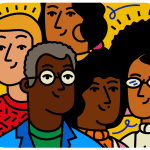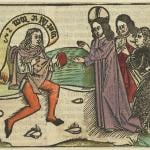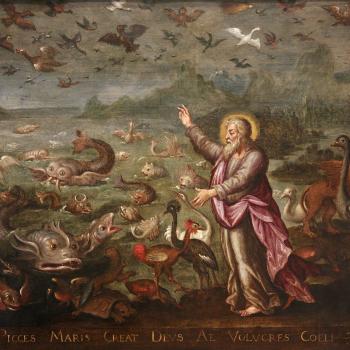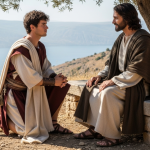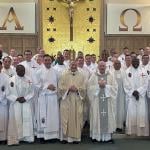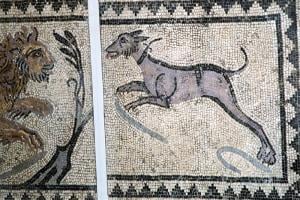
I have not always been interested in the eschatological fate of animals. When I was growing up, my understanding of salvation was very individualistic. This came from my evangelical background. I believed one had to acknowledge one’s sins, and then ask Jesus for forgiveness via the “Sinner’s Prayer” in order to be saved. Anyone who did not do this would not be saved. I was led to believe this is why Christian evangelization was important, for it revealed the only way to salvation. The irony of this, of course, comes to me now, for the message given before people pray the “Sinner’s Prayer” is that we can do nothing to save ourselves, and yet, we are then told they must say the “Sinner’s Prayer,” which is itself an action on our part. To be sure, this is not to say everything I was taught was wrong; there were elements of truth in what I believed but they were distorted. Nonetheless, what is important from this is that I believed the salvation of souls was the primary focus of the Christian life, and the souls in question were human souls. I did not have any notion as to what God would do with the rest the creation. It wasn’t my concern. It was, at best, left up to God.
When I became Catholic, I began to perceive things differently. I saw salvation in a new light. It was not meant to be so individualistic. It was meant to be communal. There was a personal aspect to salvation, and with it, we find that, far from doing nothing, we are to work out our own salvation with fear and trembling. That is, we must cooperate with grace: grace perfect nature, but only if we let it. Salvation, as I was told, was through grace, but there can be and are many means God uses to have people receive the grace they need: those who are ignorant of the Christian faith are not without means of grace – and no matter how they receive grace, it is always rooted in and comes out of the work of Christ, the Word of God made flesh.
I now know that grace is offered to all. God is at work with the whole of creation. We are not meant not meant to engage it merely as individuals apart from the rest of the world. We are persons with various relationships with others, relationships which can include animals (as seen in the bonds we make with our pets). The more we engage grace and let it work in us, the better our relationship with others should be. Those relationships will allow us to share the grace we have received with others, making us vessel of grace. This is not to say we are the only such instruments. God has many of them, as can be seen in the sacraments. What is key is that the world and all that is in it is touched by grace, and everyone and everything which incorporates grace and becomes transformed by it can become vehicles of grace to others. The world is not rejected by Christ, but rather, is touched by grace. I learned that Christ’s work extended beyond humanity.
Early in my theological studies, I got a sense of cosmic work of Christ, but I would explore it in more depth, and with it, the question of animal salvation (and any other form of life found in creation) later. It was my study of patristics, especially in regards Christology, which completed my theological transformation. Many patristic writers, each in their own way, discussed the cosmic significance of Christ. As I studied the Christological debates this became clearer until I found my understanding of it when I started reading the works of St. Maximos the Confessor (and the theological commentaries surrounding his work). My first engagement with his works was his defense of the two wills (and energies) in Christ, and, finding that work intriguing, I became interested in what else he had to say. At that time, there were only a few works of his available in English, so I supplemented my reading with the scholarly studies on his works which were available. Lars Thunberg’s Microcosm and Mediator: The Theological Anthropology Of Maximus the Confessor became the most important of them. It was that book, more than any other, which opened up my Christological vision, and with it, my understanding of the way humanity related to the rest of creation, including and especially animals. Through the years, as more texts of St. Maximos have been translated, I have picked them up and read them, finding they supplemented my own theological notions. I came to see that humanity has an important role in history, thanks to the incarnation, but we must not believe that our role meant that only humanity matters. God is concerned for all creation, with the preservation and restoration of all the good which sin has harmed and destroyed. The Word of God took on a created nature so that all creation can share in what was accomplished on the cross.
What Maximos (and others) did was give me a new way of thinking, and once I took it on, it influenced the way I saw the cosmos. It helped me see the way humanity is meant to serve as steward over creation, the relationship humans have with animals (and, all other forms of life, and indeed, matter itself) should be one of loving service instead of domination. I do not deny the special, unique role, humanity has been given in salvation history, but I see it similar to, and reflective of, the special role Israel also has in salvation history. God is at work in and with humanity, but God can be found at work in and with others, so that all of creation, all forms of life, are touched by God.
Now I believe that Christianity is meant to take on the cosmic work of Christ and engage it; Christians should look to the world around them as something which is loved by God, something which has its place in the eschaton, and so something which we should look after and protect. Since we are connected with the rest of creation, we have an interdependent relationship with it. Our eschatological destiny is one and the same. Animals can be saved because we can be saved. We can be saved because animals can be saved. The two go together. All dogs can go to heaven because all humanity can go to heaven. We undermine Christ’s work when we ignore the cosmic significance of that work. We undermine Christ’s work when we think humanity’s special place in salvation history means humanity alone can be saved, just as we undermine God’s work in history if we think only Israel mattered to God, and before the incarnation, only the Jews could be holy and be saved.
I have gone a long way from the selfish, individualistic notion of Christianity of my youth. I have also gone beyond seeing Christ’s salvific work as being exclusive to humanity. Now, when I am asked, do dogs (or cats, or fish, or hamsters, or any other pet, or creature in existence) go to heaven, I answer yes, for in the end, all things do as God will be all in all. One of the effects of Christ’s work in the incarnation is to bring about the unity of all things so that they can all find their place in the kingdom of God.
* This Is Another Post From My Personal (Informal) Reflections And Speculations Series
Stay in touch! Like A Little Bit of Nothing on Facebook.
If you liked what you read, please consider sharing it with your friends and family!
N.B.: While I read comments to moderate them, I rarely respond to them. If I don’t respond to your comment directly, don’t assume I am unthankful for it. I appreciate it. But I want readers to feel free to ask questions, and hopefully, dialogue with each other. I have shared what I wanted to say, though some responses will get a brief reply by me, or, if I find it interesting and something I can engage fully, as the foundation for another post. I have had many posts inspired or improved upon thanks to my readers.


